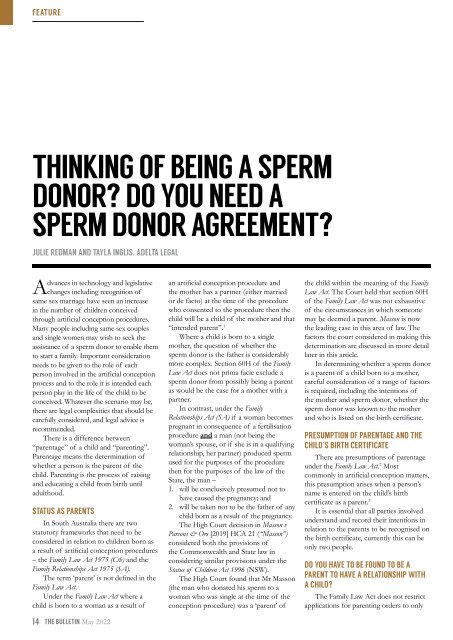LSB May 2022 LR
Create successful ePaper yourself
Turn your PDF publications into a flip-book with our unique Google optimized e-Paper software.
FEATURE<br />
THINKING OF BEING A SPERM<br />
DONOR? DO YOU NEED A<br />
SPERM DONOR AGREEMENT?<br />
JULIE REDMAN AND TAYLA INGLIS, ADELTA LEGAL<br />
Advances in technology and legislative<br />
changes including recognition of<br />
same sex marriage have seen an increase<br />
in the number of children conceived<br />
through artificial conception procedures.<br />
Many people including same sex couples<br />
and single women may wish to seek the<br />
assistance of a sperm donor to enable them<br />
to start a family. Important consideration<br />
needs to be given to the role of each<br />
person involved in the artificial conception<br />
process and to the role it is intended each<br />
person play in the life of the child to be<br />
conceived. Whatever the scenario may be,<br />
there are legal complexities that should be<br />
carefully considered, and legal advice is<br />
recommended.<br />
There is a difference between<br />
“parentage” of a child and “parenting”.<br />
Parentage means the determination of<br />
whether a person is the parent of the<br />
child. Parenting is the process of raising<br />
and educating a child from birth until<br />
adulthood.<br />
STATUS AS PARENTS<br />
In South Australia there are two<br />
statutory frameworks that need to be<br />
considered in relation to children born as<br />
a result of artificial conception procedures<br />
– the Family Law Act 1975 (Cth) and the<br />
Family Relationships Act 1975 (SA).<br />
The term ‘parent’ is not defined in the<br />
Family Law Act.<br />
Under the Family Law Act where a<br />
child is born to a woman as a result of<br />
14<br />
THE BULLETIN <strong>May</strong> <strong>2022</strong><br />
an artificial conception procedure and<br />
the mother has a partner (either married<br />
or de facto) at the time of the procedure<br />
who consented to the procedure then the<br />
child will be a child of the mother and that<br />
“intended parent”. 1<br />
Where a child is born to a single<br />
mother, the question of whether the<br />
sperm donor is the father is considerably<br />
more complex. Section 60H of the Family<br />
Law Act does not prima facie exclude a<br />
sperm donor from possibly being a parent<br />
as would be the case for a mother with a<br />
partner.<br />
In contrast, under the Family<br />
Relationships Act (SA) if a woman becomes<br />
pregnant in consequence of a fertilisation<br />
procedure and a man (not being the<br />
woman’s spouse, or if she is in a qualifying<br />
relationship, her partner) produced sperm<br />
used for the purposes of the procedure<br />
then for the purposes of the law of the<br />
State, the man –<br />
1. will be conclusively presumed not to<br />
have caused the pregnancy; and<br />
2. will be taken not to be the father of any<br />
child born as a result of the pregnancy.<br />
The High Court decision in Masson v<br />
Parsons & Ors [2019] HCA 21 (“Masson”)<br />
considered both the provisions of<br />
the Commonwealth and State law in<br />
considering similar provisions under the<br />
Status of Children Act 1996 (NSW).<br />
The High Court found that Mr Masson<br />
(the man who donated his sperm to a<br />
woman who was single at the time of the<br />
conception procedure) was a ‘parent’ of<br />
the child within the meaning of the Family<br />
Law Act. The Court held that section 60H<br />
of the Family Law Act was not exhaustive<br />
of the circumstances in which someone<br />
may be deemed a parent. Masson is now<br />
the leading case in this area of law. The<br />
factors the court considered in making this<br />
determination are discussed in more detail<br />
later in this article.<br />
In determining whether a sperm donor<br />
is a parent of a child born to a mother,<br />
careful consideration of a range of factors<br />
is required, including the intentions of<br />
the mother and sperm donor, whether the<br />
sperm donor was known to the mother<br />
and who is listed on the birth certificate.<br />
PRESUMPTION OF PARENTAGE AND THE<br />
CHILD’S BIRTH CERTIFICATE<br />
There are presumptions of parentage<br />
under the Family Law Act. 2 Most<br />
commonly in artificial conception matters,<br />
this presumption arises when a person’s<br />
name is entered on the child’s birth<br />
certificate as a parent. 3<br />
It is essential that all parties involved<br />
understand and record their intentions in<br />
relation to the parents to be recognised on<br />
the birth certificate, currently this can be<br />
only two people.<br />
DO YOU HAVE TO BE FOUND TO BE A<br />
PARENT TO HAVE A RELATIONSHIP WITH<br />
A CHILD?<br />
The Family Law Act does not restrict<br />
applications for parenting orders to only


















